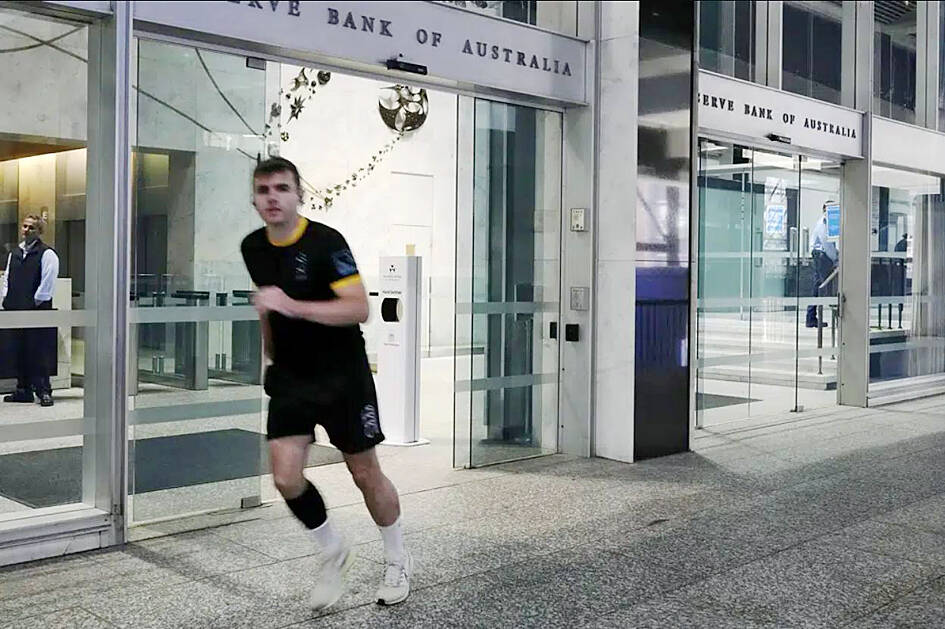Australian airline Qantas Airways Ltd yesterday named company veteran Vanessa Hudson as its first female CEO, replacing the cost-cutting Irish-Australian Alan Joyce.
Qantas, which returned to profit late last year after taking large losses during the COVID-19 pandemic, said Hudson would become CEO and managing director when Joyce retires in November after 15 years in the top job.
Hudson, who has been in Qantas’ executive ranks for nearly three decades, would remain in her role as chief financial officer until then, the airline group said.

Photo:AP
“I have worked for Qantas for 28 years and that excitement of the first day that I felt walking into Qantas, I feel still today,” Hudson told a news conference.
“We are in an incredibly strong position. We have got many things in the pipeline. That is not to say the past three years have not been challenging — they have,” she said.
“There will be many challenges, I am sure, ahead,” she said, adding that taking care of customers was “absolutely at the center of everything.”
Joyce, who had been expected to leave Qantas at some point this year, praised his successor as an “outstanding executive.”
“There are not many female CEOs of the worldwide aviation industry,” he told the news conference.
“And it’s a credit to this country that a gay Irish man was appointed 15 years ago to be CEO of the company, and now we have the first female.”
Joyce said he had extended his time as CEO at the board’s request to deal with the COVID-19 pandemic.
“If it had not been for COVID I would have retired a few years ago,” he said.
Qantas posted a profit of A$1.43 billion (US$958.3 million) before tax in the second half of last year, after accumulating A$7 billion in losses across the previous three years, weighed down by the pandemic.
However, under Joyce Qantas was heavily criticized by union leaders for sacking or standing down thousands of staff to keep a lid on costs at the height of the outbreak.
“After 15 years of Qantas downfall under Alan Joyce’s management, a new CEO has the opportunity to serve the hard-working people who built the spirit of Australia,” the Transport Workers’ Union said in a statement. “Current and illegally sacked workers deserve courageous management to take Qantas in a new direction.”
Qantas has aid that the restructuring, which saved the airline almost A$1 billion, was crucial to the company’s financial post-lockdown rebound.
Hudson said she looked forward to meeting with the unions and “developing a constructive relationship.”
Qantas had been upfront in recognizing the “customer experience was not where we wanted it” during the pandemic, she said.
However, the airline invested heavily in improving its performance “and it is back where we were pre-COVID,” she said.

Intel Corp chief executive officer Lip-Bu Tan (陳立武) is expected to meet with Taiwanese suppliers next month in conjunction with the opening of the Computex Taipei trade show, supply chain sources said on Monday. The visit, the first for Tan to Taiwan since assuming his new post last month, would be aimed at enhancing Intel’s ties with suppliers in Taiwan as he attempts to help turn around the struggling US chipmaker, the sources said. Tan is to hold a banquet to celebrate Intel’s 40-year presence in Taiwan before Computex opens on May 20 and invite dozens of Taiwanese suppliers to exchange views

Application-specific integrated circuit designer Faraday Technology Corp (智原) yesterday said that although revenue this quarter would decline 30 percent from last quarter, it retained its full-year forecast of revenue growth of 100 percent. The company attributed the quarterly drop to a slowdown in customers’ production of chips using Faraday’s advanced packaging technology. The company is still confident about its revenue growth this year, given its strong “design-win” — or the projects it won to help customers design their chips, Faraday president Steve Wang (王國雍) told an online earnings conference. “The design-win this year is better than we expected. We believe we will win

Chizuko Kimura has become the first female sushi chef in the world to win a Michelin star, fulfilling a promise she made to her dying husband to continue his legacy. The 54-year-old Japanese chef regained the Michelin star her late husband, Shunei Kimura, won three years ago for their Sushi Shunei restaurant in Paris. For Shunei Kimura, the star was a dream come true. However, the joy was short-lived. He died from cancer just three months later in June 2022. He was 65. The following year, the restaurant in the heart of Montmartre lost its star rating. Chizuko Kimura insisted that the new star is still down

While China’s leaders use their economic and political might to fight US President Donald Trump’s trade war “to the end,” its army of social media soldiers are embarking on a more humorous campaign online. Trump’s tariff blitz has seen Washington and Beijing impose eye-watering duties on imports from the other, fanning a standoff between the economic superpowers that has sparked global recession fears and sent markets into a tailspin. Trump says his policy is a response to years of being “ripped off” by other countries and aims to bring manufacturing to the US, forcing companies to employ US workers. However, China’s online warriors